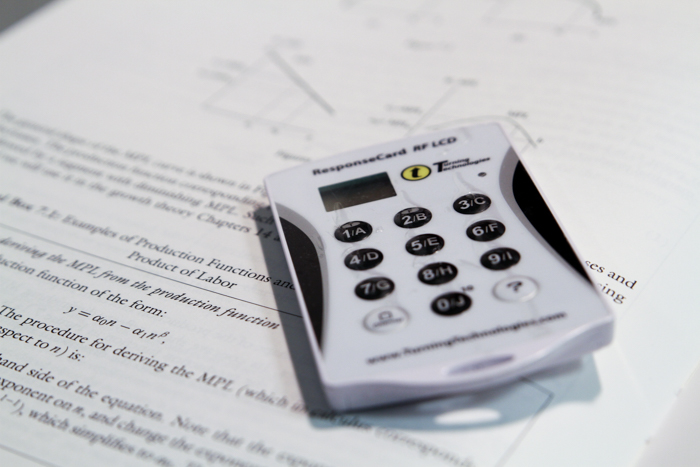As of Fall 2016, courses at McGill University will no longer use clickers for in-class surveys. Instead, Teaching and Learning Services (TLS) has introduced TurningPoint Cloud, a new web-based polling technology. Unlike clickers, TurningPoint Cloud is free for students, allowing them to mark their attendance and participate in quizzes and surveys using their laptops, cell phones, and tablets. The software also features new polling formats, such as open-ended questions and spontaneously created surveys as well as word clouds of student responses and and demographic analysis of student responses.
According to Adam Finkelstein, an Academic Associate at TLS, the software even allows for a Jeopardy-style competition.
“There’s all sorts of interesting engagement strategies,” Finkelstein said. “We’ve moved from a device where you can only press a button to now [where] you can type out a whole answer.”
TLS has been working with TurningPoint Cloud since May 2016 to implement the new technology, which was first piloted in classrooms during Summer 2016. The first true test of this new technology at McGill began this semester. “With the first few days it's sort of been, like, crazy. The fact that we haven't had a huge number of tickets to IT is a good sign.” Finkelstein said. A major concern, however, is how the web-based survey technology will handle the online traffic of large lectures.
“Leacock 132 is probably the biggest challenge. What [will happen] when 600 people use it at once?” Finkelstein said.
In order to address these concerns, both TLS and the McGill IT Department are offering support for instructors using TurningPoint Cloud. Dr. Laura Pavelka, a faculty lecturer from the Department of Chemistry, has experienced success using the survey technology with over 700 students at once in both her CHEM 110 and CHEM 212 lectures.
“I was, and still am, quite excited for the change to TurningPoint Cloud,” Pavelka said. “It is definitely a challenge to have hundreds of students connecting to the same Turning Point Cloud [session] at the same time. Once that is solved, this system is golden.”
For Pavelka, one of the primary benefits of TurningPoint Cloud is the accessibility to instructors as well as students. Pavelka says she has yet to try the new features, but is interested in incorporating open-ended survey questions into her lecture.
"I find the open-ended polling questions intriguing though and will probably start using them in the coming weeks”, Pavelka said.
Instructors who use polling will no longer have to carry a receiver to class, and students won’t have to purchase or bring a physical clicker to lectures anymore. So far, the departure from clickers has received mixed responses. Anurag Kalra, U2 Computer Science, voiced his displeasure with the discontinuation of clickers.
“I bought it for $30 and only used it once,” Kalra said. “I feel ripped off.”
Kalra says his lecture used it to take attendance, something he feels could have been done without spending any money. Although the switch to TurningPoint Cloud will financially benefit new students, it has also made reselling clickers impossible for returning students. There is, despite drawbacks, a small consolation, Finkelstein explained.
“If a student brings their clicker to the Brown building. they’ll basically get a coffee card that they’ll use for free coffee,” Finkelstein said.
According to Finkelstein, this is part of an environmentally-friendly initiative to recycle the clickers. Rather than allow students to dispose of clickers in the trash, TLS will send the clickers back to the company that sold them for repurposing.
“It’s not just ‘you get a free coffee,’ it's [that] you’re doing your due diligence to make sure these things don’t end up in the garbage,” Finkelstein said.







